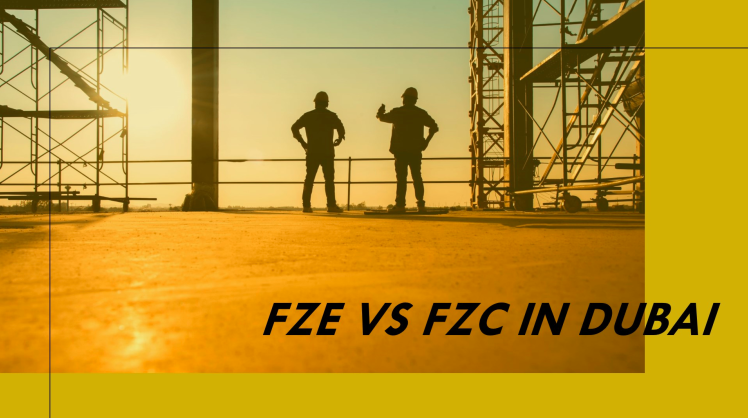FZE vs FZC in UAE: Understanding the Differences

For those looking to tap into the strategic advantages of the UAE free zones, it is crucial to understand the difference between FZE and FZC, the two popular entities in the region. Although both cater to different business needs and requirements, they offer similar benefits such as 100% foreign ownership, tax exemptions, etc.
Through this article, we will explore the key characteristics, legal frameworks, and prerequisites of FZE vs FZC and take an insight into how each entity functions within the dynamic business landscape of the United Arab Emirates.
Free Zone company setup in the UAE
There are around active free zones in the UAE with each governed by its respective Free Zone Authority (FZA). They are designed for one or more commercial categories, and therefore, offer licenses to businesses operating within these categories.
Additionally, there are many benefits to setting up a company in the Free Zone:-
- No requirement for a local partner/sponsor for the establishment
- Full repatriation of capital and profits
- Exemption from taxes
- No currency restrictions
- Wide variety of commercial activities
- Availability of abundant and inexpensive energy resources
- Modern and efficient communication facilities
- Logistic efficiencies
- Serviced desks and office facilities
- Excellent support services
- State-of-the-art infrastructure with modern corporate spaces, warehouses, and amenities
- Streamlined process with minimal paperwork and quick registration
- Easy access to regional and international markets
- Access to a multicultural workforce
- Easy recruitment procedures
- Low freight charges
Understanding the difference between FZE and FZC
Free Zone Establishment (FZE)
The Free Zone Establishment operates with a single shareholder, either an individual or a corporate body. This structure is ideal for those seeking sole ownership of their enterprise. Due to the single-shareholder system, the operations become uncomplicated and the management process is streamlined. However, if the owner plans to transfer any shares, then it needs to be approved by the respective free zone authorities to ensure compliance with local regulations.
FZEs follow governance guidelines specific to their Free Zone. As per these guidelines, the company must appoint at least two directors and a company secretary, or just employ one individual who can fulfill both roles. Similarly, to obtain a license, they need to present audited financial statements to the authorities annually within three months of the end of the fiscal year. This practice ensures financial transparency within the free zone.
Free Zone Company (FZC)
Unlike a Free Zone Establishment, a Free Zone company can have up to five shareholders, who determine the distribution of shares as they see appropriate. They can either choose to take on management roles or employ a manager to manage the company, depending on their expertise and requirements.
Additionally, to establish an FZC, all the associated partners and shareholders are required to participate in the documentation and signing process. Unlike Mainland structures, there is no condition for the minimum share percentage one can hold, rather they can make this decision according to the company’s strategic objectives.
FZE vs FZC: Key Differences
Both FZE and FZC offer comparable benefits such as foreign ownership, tax exemptions, etc. making them an attractive choice for international investors and entrepreneurs. So, how do you decide which one to choose? Let’s delve deeper –
The number of shareholders – An FZE is ideal for a single shareholder, while an FZC can be established and operated by two to five shareholders. This difference affects the ownership and operational structure of the business.
Capital requirements – The initial capital investment for both entities is not uniform, and hence can vary depending on the specific Free Zone and the nature of the business activity.
Legal status and liability – The owners of both entities can avail benefit of limited liability, such as protection of personal assets from business risks. Besides, for the transfer of shares, they need to seek approval from the relevant Free Zone authorities to maintain regulatory compliance.
Business scope – The regulations of the free zone dictate the operational guidelines for both FZEs and FZCs. For example, the appointment of directors and company secretary, timely submission of audited financial statements, maintenance of transparency, and adherence to the free zone’s governance standards.
Profit sharing – Being a sole shareholder entity, the profit distribution structure is predetermined in FZE, whereas, in FZC, the profit-sharing structure is according to the specific investment contributions and roles of the shareholders within the company.
Flexibility and scalability – Though FZE is a straightforward structure, adding more shareholders can be bureaucratic. Compared to that, FZCs are more adaptable. It is easy to add or remove shareholders within the permitted limit, thereby allowing seamless growth and evolution of the company.
Read also: Spend Controls for Sustainable Business Growth
Tips to choose the right structure for your business
- Assess business needs and goals
To select an appropriate structure, you need to conduct a thorough analysis of your business objectives. This decision will depend on several factors such as the number of visas, the desire for complete ownership, etc.
- Understand tax and legal consequences
It is crucial to get a proper understanding of the tax benefits and legal requirements that come with your chosen business format. For instance, in free zones, corporate shareholders are allowed to allocate ownership stakes as per their desire, whereas in the Mainland, the rules are more stringent. This feature can help in strategic planning and tax management.
- Setup and registration procedure
The procedures for registering a business in a Free zone depend on the type of entity and the specific regulations of the free zone. Besides, the stipulated permissible range of shareholders in certain free zones can affect the cost structure.
Hence, shareholders don’t need to contribute proportionally for business setup, however, their agreement and active participation in the investment amounts and the managerial framework is imperative.
Steps to start a business in a UAE Free Zone
Setting up a business in the free zone is not much of a hassle. You just need to follow the below procedure step-by-step:-
- Determine the Business Entity
- Choose a Trading Name
- Apply For a Business License
- Choose An Office Space
- Get Pre-Approvals
- Register Your Business
- Get Your License
- Open Your Corporate Bank Account
Requirements for Free Zone Company Formation
To begin the company formation process in the Free Zone, you will require the following documentation and due diligence –
- Passport Copy and UAE Visa of non-resident shareholders
- Proof of Address
- Professional Reference Letter
- Summary of professional history/CV
- Company registration form
List of prominent Free Zones in the UAE
The Free Zones in the UAE are tailored to various industries such as media, technology, finance, healthcare, logistics, aviation, etc. Here’s a list of some of the popular ones –
- Jebel Ali Free Zone (JAFZA)
- Dubai Multi Commodities Centre (DMCC)
- Dubai Silicon Oasis (DSO)
- Dubai Airport Free Zone (DAFZA)
- Dubai Internet City (DIC)
- Dubai Media City (DMC)
- Dubai Healthcare City (DHCC)
- Dubai International Financial Centre (DIFC)
- Dubai Multi Commodities Centre (DMCC)
- Dubai Knowledge Park (DKP)
- Dubai World Central (DWC)
- Fujairah Creative City (FCC)
- Ras Al-Khaimah Economic Zone(RAKEZ)
Unlock your Dubai dreams with Shuraa
Thus, it has been made clear that Free Zones in the UAE offer the perfect platform for business setup, whether you are an individual entrepreneur or a team of passionate investors. Understanding the core difference between FZE and FZC can help you choose the right fit for your business idea and confidently embark on your journey to success.
However, if you still have any confusion, you can always reach out to the team of experienced business setup consultants at Shuraa Business Setup. They will guide you through the difference between FZE and FZC and other intricacies of these structures.
Connect with Shuraa and propel your Dubai dream forward.




